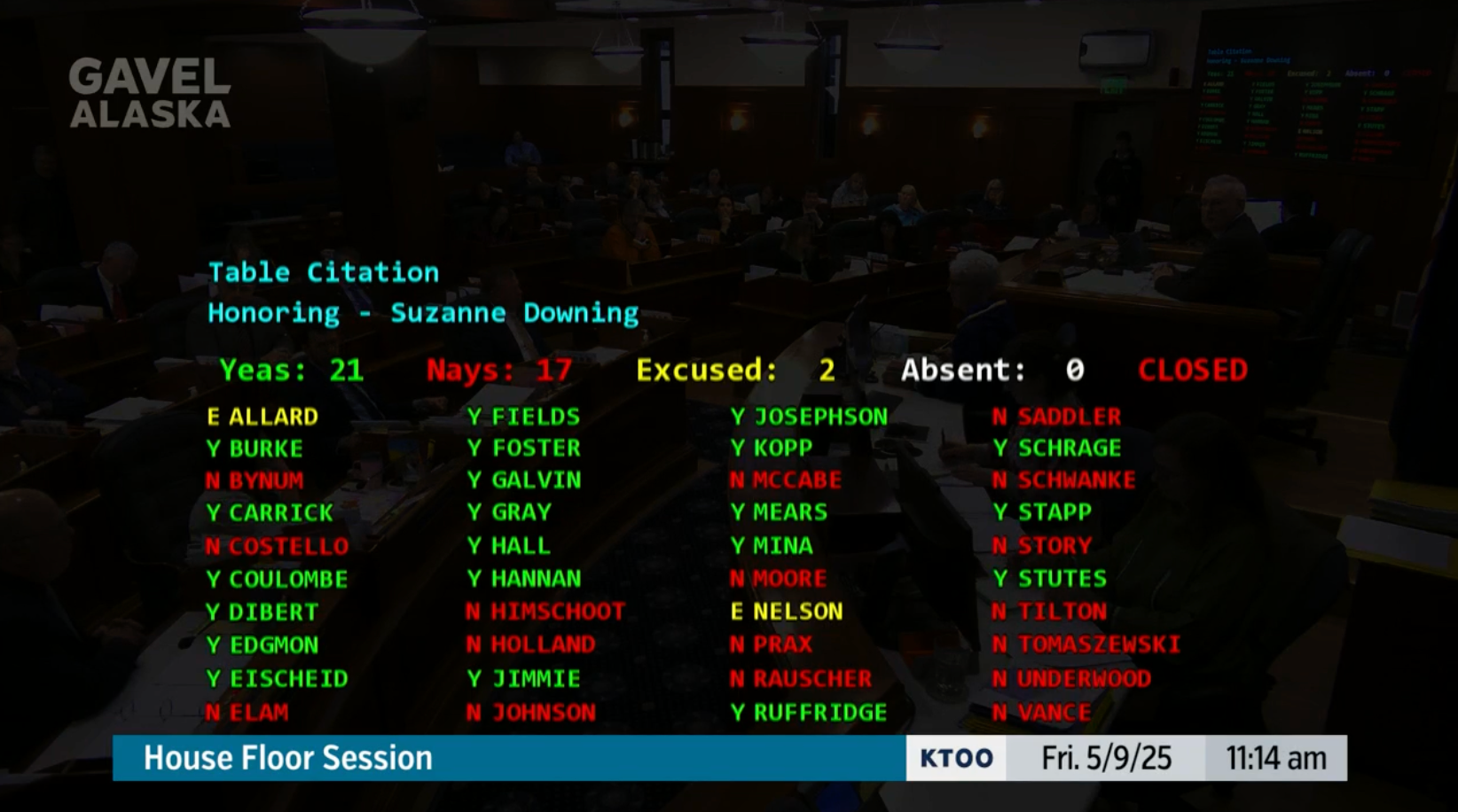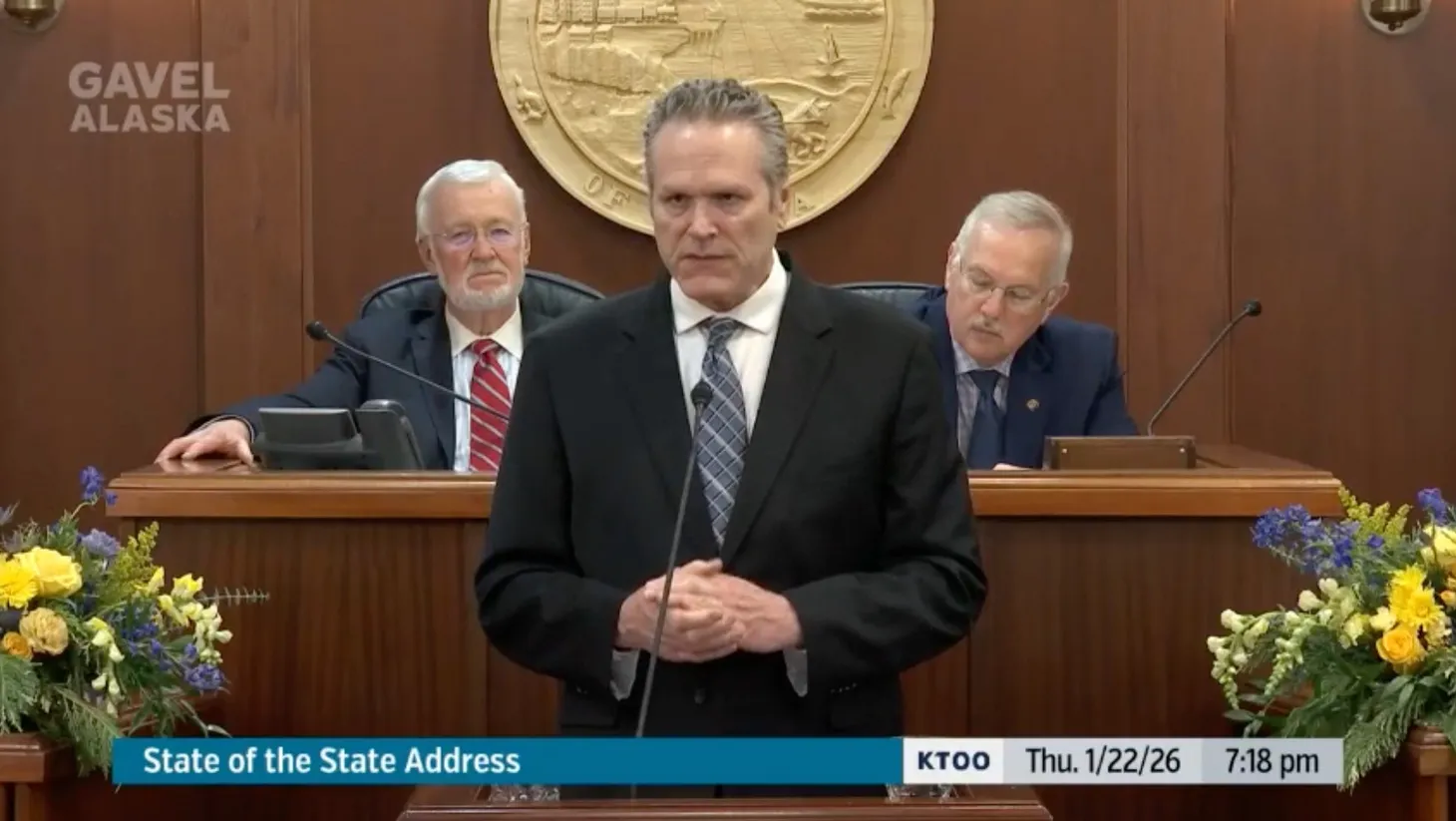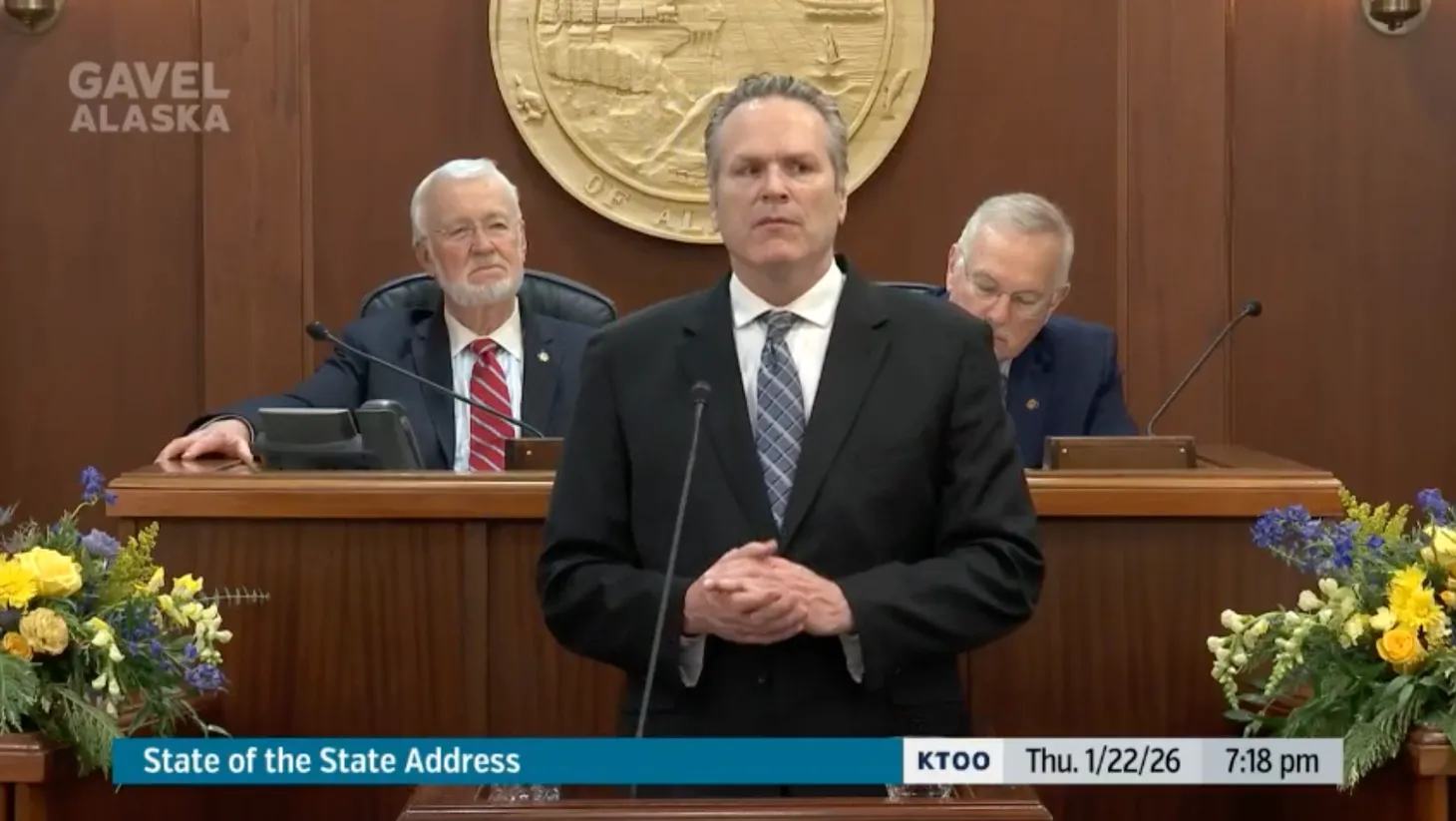Dunleavy prepares to slash public school funding in fight for half-baked policies
But leave it to Dunleavy to kill a unicorn.

Happy Friday, Alaska! It's Day 109 of the legislative session.
In this edition: Here we go again. Gov. Mike Dunleavy is threatening to blow up a school funding compromise bill if he doesn't get his way on a slate of policies that legislators warn are half-baked. Not only will he veto House Bill 57, a much scaled-back education bill salvaged in the wake of his last public school funding veto, but he told school administrators that he'll find other ways to cut their funding if the Legislature doesn't comply with his demands. Meanwhile, the Alaska Legislature has sent the operating budget to a conference committee after the Senate passed its no-fun version of the budget, the Legislature approved the first new source of revenue in years and the House nixed a citation honoring Florida's most prolific Alaska blogger. Also, the reading list and weekend watching.
Current mood: 😎
Dunleavy prepares to slash public school funding in fight for half-baked policies

This year's fight over education funding isn't over yet, despite legislators reaching a hard-fought education deal last month that included a permanent increase to the per-student funding formula, a slate of broadly agreeable policies and a way to pay for it. After a period of uncharacteristic public silence on the measure, Gov. Mike Dunleavy called in Alaska's superintendents to tell them that he plans to veto the bill and slash school funding in the budget if legislators don't comply with his demands. If you care about your district's funding, Dunleavy and Education Commissioner Deena Bishop warned in a closed-door meeting reported on by Alaska Public Media and the Anchorage Daily News, you'd better help advocate for a slate of changes that legislators warn aren't ready for prime time.
His demands include an open enrollment policy that legislators warn could block military families from enrolling in their local schools and an expansion of the public charter school approval system that would take control away from local communities. Both ideas have been non-starters with legislators, who say they might have merit but need more studying to understand the potential impacts. It's also important to note that the administration has barred state employees from talking to legislators without prior approval.
The governor's also demanding the reading grants from the compromise bill be unlinked from the online tax bill, arguing that they should be funded through the state’s already-tight budget (Dunleavy proposed a budget with a $1.5 billion deficit and has broadly refused to entertain any new taxes). The one demand he seems to have dropped is a request to increase funding for homeschool programs on top of the baseline funding increase that everyone, including homeschool students, gets.
The threat marks the latest curveball for school districts that have struggled to craft budgets amid uncertain state funding, forcing them to make contingency budgets that outline severe cuts to teachers and programs. Some districts walked back the most severe cuts in the wake of the Legislature's passage of House Bill 57, the scaled-back compromise passed last month, but that looks to be premature. The impacts if Dunleavy ultimately follows through on his threats will be felt throughout Alaska, but particularly in rural communities, where the higher cost of living has far outpaced roughly a decade of stagnant baseline funding for schools.
While legislators may likely be able to overcome the 40-vote threshold to override the veto, he could attack school funding in the state's operating budget, which would both be more difficult to override at 45 votes and more logistically challenging given that a veto would come after legislators have adjourned.
How a session that started with hope about school funding is on the verge of disaster
Legislators hoped to deliver a substantial increase in education funding this session, but amid budget turmoil and opposition from the governor dashed those hopes. Instead, legislators salvaged a modest compromise deal last month after the governor vetoed a larger increase to baseline per-student funding. The deal would make the current one-time funding levels permanent, while incorporating some of the governor’s other priorities, such as a cellphone ban on school campuses and targeted reading grants for schools that demonstrate improvement.
The vote marked a cautious victory for legislators and school districts, a potential breakthrough that combined funding with policy and a way to pay for it. The reading grants, which make up the largest pot of new money in the bill, will only be funded if a tax change targeting online businesses’ sales in Alaska becomes law.
“We've asked about compromise all year, that's been our theme,” Clayton Holland, the superintendent of the Kenai Peninsula Borough School District, told Alaska Public Media. “And I believe the legislators did that, right? They came up with a bill that no one really got everything they wanted out of it, which I think is … a good thing.”
That measure, House Bill 57, passed with a combined vote of 48 to 11, which would be enough to override a veto if everyone holds firm to their votes (not a guarantee after last year's education veto stood when several Republicans flipped on the bill). But even if legislators overcome a veto, Dunleavy has also pledged to go after the funding for it in the state budget, a veto that would have a higher bar to overcome.
Instead of rallying districts to the governor's side, the meeting seems to have crushed the spirits of school administrators already exhausted by the back-and-forth uncertainty around funding. The scaled-back school funding bill, which really only delivers an additional $20 to the Base Student Allocation over current funding levels, was already a massive compromise for schools.
“It feels like all of the students, even the students that are most in need, are being held as bargaining chips,” Madeline Aguillard, the head of the Kuspuk School District who attended the meeting, told Alaska Public Media.
Holland told the Anchorage Daily News that the Kenai Peninsula Borough School District would have a “fire sale” of cuts if his vetoes come to pass, but he still won’t be lobbying for the governor’s policies after the threat. Frank Hauser, the Juneau School District’s superintendent, told the ADN that threatening school districts’ funding in an attempt to strongarm them into supporting his policies was unprecedented and ignored the very dire situation districts are in.
“I did not hear a lot today about all Alaska students and their immediate needs. I think that all Alaska’s children need support now,” he told the paper.
More coverage: Alaska Public, ADN, KTUU
The Senate passes a no-fun budget as a sign of things to come, while tax bill could be doomed

The operating budget is headed to the conference committee, marking the start of the final act of this year's legislative session. The Senate landed its version of the operating budget this week with a minor surplus reached by essentially eliminating every bit of new spending proposed by the House and Gov. Dunleavy. It slashes the dividend down to $1,000 – the smallest ever dividend when adjusted for inflation – and excludes a slate of other proposed increases to early education, prisons and road maintenance. Importantly for the Senate's budget leaders, though, the plan doesn't require tapping into the state's savings accounts.
"With all of these budget headwinds, it's clear to me that the decisions next year are going to be even more difficult than the decisions that we have made today," said Bethel Sen. Lyman Hoffman, who oversees the operating budget for the Senate Finance Committee. "Now is the time to preserve the rainy-day fund for that coming storm."
He laid out four major pressure points that have the potential to blow up the budget over the next year:
- Continued uncertainty around federal funding under President Trump, noting that just a 5% pullback in funding would amount to a $300 million budget hole.
- Oil prices are already below the spring revenue forecast of an average of $68 per barrel, with futures trading even lower at about $60. For each $1 less in average oil prices over the year, the state's revenue swings by about $35 million to $45 million. That could add up to as much as a third of a billion dollars.
- Despite keeping savings untouched, the budget still relies on about $100 million in one-time pockets of money that will need to be replaced next year.
- Contractural increases, such as labor contract agreements, to bring state pay up to a competitive level. State officials estimated that implementing the results of the recent pay study would cost about $190 million, all said and done.
That means pressures largely outside of the Legislature's control could see the state's deficit balloon to nearly a billion dollars next year as many of the state's growing list of needs, from services to maintenance to investments, go unaddressed. During the debate, Sen. Jesse Kiehl noted that the budget isn't keeping up with inflation anymore, meaning that services are declining.
The austere state of the budget has been feeding renewed calls for the state to address new revenue, with Sen. Bill Wielechowski noting that the state's effectively spending more on oil tax credits and deductions than the $1,000 PFD.
“We need to reevaluate how we are doing things in this state,” Wielechowski said. “We are not following our constitutional obligation to get the maximum value for our resources. If you want a full PFD, you want to have a 50-50 PFD, you have to fix oil taxes. You absolutely have to do that.”
But any new revenue looks pretty unlikely as long as the person wielding the veto pen remains the same.
Tax passes, but Dunleavy remains unmoved
Speaking of new revenues, the Alaska Legislature approved the first new major source of revenue in years this week after the House approved Senate Bill 113. The measure reworks the state's corporate income tax to apply to business done in Alaska rather than to companies based in Alaska. The move is aimed at extending the tax to Outside businesses that are doing online business in the state, and is expected to raise between $25 million and $65 million annually.
Backers of the measure, which is a deeply wonky piece of tax policy, argue that it shouldn't have a major impact on Alaskans or Alaska businesses. That's because, by and large, those taxes are already being collected, just by other states. By passing the law, the state would opt into a multistate compact for how corporate taxes are collected in the digital era, essentially diverting the money into the state. Alaska-based businesses that are doing business with other states will see their Alaska corporate tax bill drop.
“It’s about as close as you can get to a unicorn bill to raise money for the state of Alaska,” Sen. Bill Wielechwoski, D-Anchorage, said at a news conference last month, according to the Alaska Beacon. “It’s a bill that doesn’t raise taxes on Alaskans, doesn’t raise taxes on Alaskan businesses. It’s not going to cost any more simply by changing the structure of our corporate income tax. It will probably, quite frankly, shift money from other states to the state of Alaska, and so it’ll be a unicorn. It’s kind of a rarity. There’s probably not too many of these out there.”
But leave it to Dunleavy to kill a unicorn.
His refusal to entertain any form of new taxes appears to be unmoved, a position he's maintained since he entered office and Americans for Prosperity took him on a roadshow to promote a plan that would require both legislative and public approval of any and all new taxes. He reiterated that position in a May 7 letter that was reported by KTUU, signalling another veto.
"As such, I cannot support standalone tax measures. I am issuing this message to reaffirm my long-standing position as Governor: the Legislature and the Executive Branch must establish a joint team to develop a comprehensive, sustainable long-term fiscal plan that ensures stability and fosters economic growth."
In it, he proposes yet another fiscal policy working group with legislators that, if they accept, would essentially have the impact of running out the clock on Dunleavy's time in office, sparing him the distinction of being a governor who did anything tough to solve the state's fiscal dilemma.
It should be noted, too, that the executive branch has been notably missing.
Dunleavy's lack of leadership on the fiscal plan over his six-plus years in office has been glaring. At one point, he teased a sales tax but never submitted it, and then pulled the plug on a special session to discuss a fiscal plan. Legislators have also complained that the administration has been difficult or impossible to deal with in the final days of this year's session, with the administration taking the unusual step of issuing a written warning to all state employees not to talk to legislators without prior approval.
Oh, and that's not to mention the administration is actively blocking legislators from ensuring the state is collecting the full oil and gas tax revenue it's due.
Additional coverage: Alaska Beacon, ADN, The Alaska Current (me) and KTUU
'A long record of outright dishonesty'

Today, in an unusual move, the House voted 21-17 against forwarding a citation honoring Florida's most prolific Alaska blogger, Suzanne Downing. The motion to table the citation, which effectively kills the measure, was made by Anchorage Democratic Rep. Zack Fields, who said the Legislature shouldn't be in the business of honoring someone with "a long record of outright dishonesty."
The motion kicked off a prolonged bit of drama on the House floor that ultimately gave way to a 21-17 vote. Minority Republican Reps. Julie Coulombe, Justin Ruffridge and Will Stapp (the trio of moderate-by-comparison minority members) broke from the minority to vote with all but three members of the House Coalition Majority. Majority Reps. Rebecca Himschoot, Ky Holland and Andi Story voted against tabling the citation.
Also, hat tip to David Reamer for recalling another time the Legislature nixed a citation for a far-right pundit:
— David Reamer (@anchistorian.bsky.social) 2025-05-09T20:12:20.152Z
Full coverage: Alaska Beacon
Reading list
- From Alaska Capitol’s cafeteria, author and illustrator claims Pulitzer Prize
- Trump administration stopping NOAA data service used to monitor sea ice off Alaska
- Alaska’s attorney general flew to South Africa and France. A corporate-funded group paid.
- How a Pacific Northwest delicacy got caught in the crossfire of Trump’s trade war with China
- Anchorage Mayor LaFrance wants to criminalize unauthorized fires
Weekend watching
The new season of Taskmaster with chaos agent Jason Mantzoukas is out!
Have a nice weekend, y'all.
The Alaska Memo Newsletter
Join the newsletter to receive the latest updates in your inbox.




